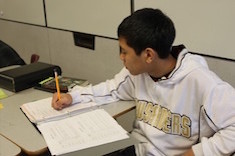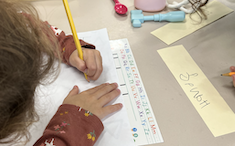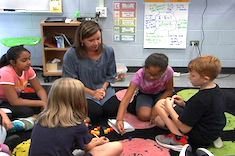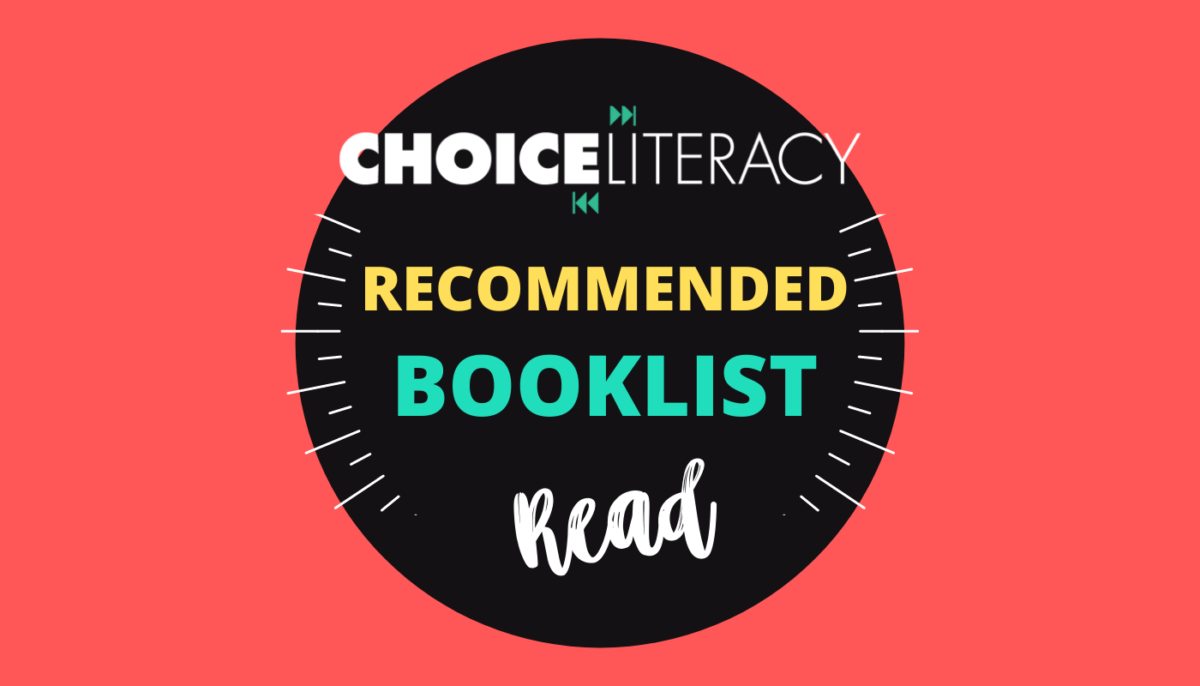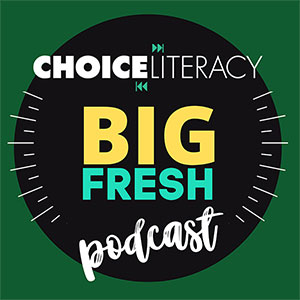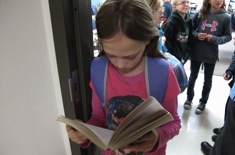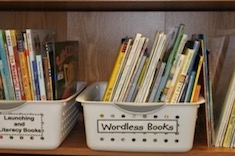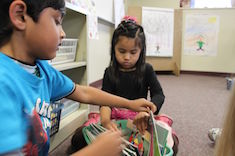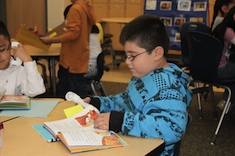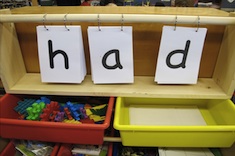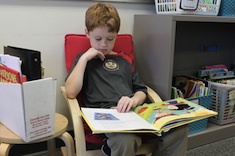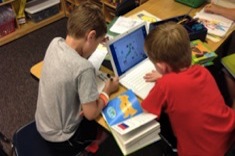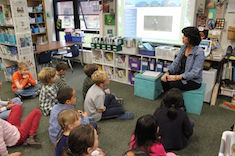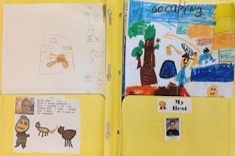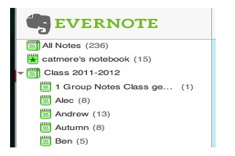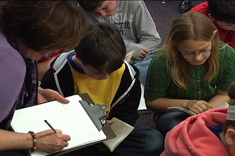Cathy Mere
Cathy Mere has taught grades K-6 and worked as a literacy coach and a Reading Recovery teacher in Ohio. Currently she works as a reading specialist supporting literacy learners. Cathy is the author of More Than Guided Reading. She shares her professional reflections at Reflect and Refine: Building a Learning Community and dabbles in poetry and personal essay at Merely Day by Day. Cathy can be found @cathymere on Twitter.
All Content
When They’re Hard to Teach
Cathy Mere reminds us of the complexities of teaching readers, especially those who are in intervention. She shares the “rules” she’s put in place for herself when a rough patch is hit and little growth is gained.
Teaching Writers to Hear Feedback
Cathy Mere outlines ways writers can position themselves to hear (and use) feedback.
Helping Writers Self-Correct
What to do with writers who catch errors in isolation but not in their own writing? Cathy Mere suggests three ways to help students self-correct their writing.
Constantly Evolving Toward a Stronger Practice
In education much attention is paid to change and transformation. Cathy Mere challenges us to consider placing our focus on evolution and understanding that we are constantly evolving toward a new version of ourselves. In this personal essay, we will all find hope as we reach toward our strengths and use them to find our next steps forward.
November 11, 2022: Stronger Conferences and Feedback
This week’s newsletter is about engaging secondary students.
Changing Positions? How to Rethink Your Community (Download)
Cathy Mere offers practical steps to finding a new community when you switch positions. Download a copy of a guided reflection to intentionally seek a new community.
Reading Specialists Can Change the Narrative
Cathy Mere shares ways reading specialists can help teachers get excited about striving readers’ growth by intentionally sharing progress and celebrations.
Bring Me Something Funny (Booklist)
Cathy Mere offers a booklist in response when a teacher asks her to “Bring me something funny.” These books are sure to fill your classroom with lighthearted laughter.
Growing Professional Learning Communities
Cathy Mere encourages instructional coaches to take the best parts of workshop practice and apply it to coaching.
Rehearsal for Writers Podcast
Cathy Mere and Ruth Ayres discuss student-led learning on the podcast.
Making Data Personal Podcast
Cathy Mere and Ruth Ayres discuss student-led learning on the podcast.
Student-Led Learning Podcast
Cathy Mere and Ruth Ayres discuss student-led learning on the podcast.
Feedback to Writers (Part 2) Podcast
Cathy Mere and Ruth Ayres discuss feedback to writers on the podcast.
Encouragement for Readers and Writers Podcast
Cathy mere and Ruth Ayres discuss building connections beyond the classroom.
Building Connections Beyond the Classroom Walls Podcast
Cathy mere and Ruth Ayres discuss building connections beyond the classroom.
The Classroom Library: Building Bridges
Cathy Mere presses to help children take the first steps in growing a sustainable reading life that carries beyond the classroom walls. She offers ways to build bridges to the school and public libraries as an essential step.
Assessing Readers Podcast
Cathy Mere and Ruth Ayres discuss assessing readers.
October 1, 2021: Assessing Readers
Assessing readers is the theme of this week’s newsletter.
Using Picture Books Podcast
Cathy Mere and Ruth Ayres discuss using picture books in literacy instruction.
Making Workshop Work Podcast
Cathy Mere and Ruth Ayres discuss making workshop work.
The Choice Literacy Book Club Discusses Ouch! Moments
The Choice Literacy Book Club discusses Ouch! Moments: When Words Are Used in Hurtful Ways by Michael Genhart and Viviana Garofoli.
How Do Visuals Strengthen Literacy Instruction? Podcast
Cathy Mere and Ruth Ayres discuss the new content related to the way visuals strengthen literacy instruction.
Finding Reliable Digital Resources
Cathy Mere provides a guide to determining the reliability of digital reading resources.
Supports for Our Youngest Writers
Cathy Mere identifies ways to support our youngest writers.
Finding Reliable Digital Reading Resources
Cathy Mere shares how to find reliable digital reading resources to pair with print materials to provide strong opportunities for student learning.
Beyond Personal Narrative: A Change in Perspective
Cathy Mere nudges us to consider perspective as a craft move and provides a stack of mentor texts in this booklist.
Coaching and Demonstration Lessons
Literacy coaches Cathy Mere and Kelly Hoenie talk about the value and challenges of demonstration lessons.
Build Reader Identity
Cathy Mere knows that growing skills and strategies readers need is essential, yet helping readers find and grow their identity as readers makes the biggest difference of all.
Teacher to Literacy Coach Transition
Literacy coaches Cathy Mere and Kelly Hoenie talk about the transition from being a teacher to becoming a coach.
Coaching Minute: Language of Reading
In this brief video, Cathy Mere talks with Andrea, a literacy coach and reading specialist, about the importance of common language during debrief sessions when talking about reading.
Coaching in a Time of Crisis
Cathy Mere explores some of the new routines literacy coaches have put in place as they move between live and remote guidance of teachers.
They Don’t Know High-Frequency Words
Cathy Mere shares strategies for coaching teachers with a common complaint—their students don’t know high-frequency words. Download a reference guide for questions and next steps to guide coaching conversations.
Poetry Resources for Remote Learning
Poetry can be the glue that holds many virtual classroom communities together. It works for quick morning meeting openings, transitions, or even a bit of laughter when energy is flagging. Cathy Mere shares her favorite poetry resources for remote learning.
The Feedback Trap
Cathy Mere considers the differences between feedback and reflection, and why it’s important to have a balance when coaching teachers.
Book Selection for Early and Emergent Readers
Some emergent readers happily browse for books and explore them independently. For others, it’s a struggle. Cathy Mere shares her favorite strategies for helping all readers get comfortable with selecting books on their own.
A Heart for Coaching
“Do you miss the classroom?” Cathy Mere has answered this question often. It makes her think about the differences between coaching and teaching, and how it takes time to develop a coaching heart.
You Don’t Write? No Worries
“You don’t have to write to teach writers.” Cathy Mere finds is shocked when she hears a literacy coach make this statement. But the more she allows her conventional wisdom to be challenged, the more insight she has into helping teachers who don’t see themselves as writers.
Making Time for Reflection
Reflection time is essential for literacy coaches. Cathy Mere shares practical tips for how she builds that time into her work with literacy coaches.
Raising Student Voices: Mentor Texts
Helping students find and raise their voices so that they can someday change the world is one of the most important things we do. Cathy Mere shares some of her favorite mentor texts for this essential work.
Coaching Minute: Advice for New Coaches
In this quick video, Cathy Mere shares some advice for new coaches.
Mentor Texts for Teachers: Home Is a Place to Begin
Looking for mentor texts to help teachers write? Cathy Mere suggests you begin with home.
Managing Take-Home Books
Sending books home with young readers is essential. Cathy Mere gives lots of practical tips for designing a take-home books program and communicating with families about what young readers need.
Coaching Minute: Collaboration
In this brief video, Cathy Mere talks with literacy coach Kelly Hoenie about collaboration with reading specialists.
Ending the Year by Looking Forward
In this short video, Cathy Mere asks literacy coach Kelly Hoenie to think about how she will use learning from the end of the school year to plan for next year.
Fewer Books and More Options at the End of the Year
Cathy Mere considers the dilemma teachers face when the bookroom, library, and tech departments require books and devices to be returned late in the year . . . but there are still a few weeks of school. She shares many suggestions for fostering literacy and community when there are far fewer books in the room.
Closing Out Professional Communities
What should literacy coaches do at their last meeting of the year? Cathy Mere remembers how she closed the year with students to plan her closing activities with coaches.
A Peek at a Coaching Notebook
Literacy coach Kelly Hoenie opens up her coaching notebook and shares with Cathy Mere what she writes down during observations and consultations, as well as how she uses the information when conferring with teachers.
Letting Go: Nurturing Ownership in Writing
Cathy Mere helps a study group of elementary teachers think through how to nurture more ownership of student writing.
What’s the Temperature?
Cathy Mere substitutes in leading a meeting, and realizes the importance of always slowing down and taking the temperature of the room when beginning professional development sessions. She shares her seven favorite strategies for slowing down and reading the room.
Coaching Minute: Building Coach and Specialist Collaboration
In this coaching minute video, Cathy Mere and Kelly Hoenie talk about the importance of more collaboration between literacy coaches and reading specialists, and how to foster it.
Coaching Minute: Using Video with Literacy Coaches
Cathy Mere shares four quick tips to help literacy coaches use video thoughtfully in professional development and to hone their own instructional skills.
Coaching Minute: Flexible Collaboration with Teachers
Cathy Mere chats with Kelly Hoenie about how her collaboration with teachers has changed over 15 years of coaching—from rigid protocols to in-the-moment decisions about how best to support each teacher.
Supporting Readers: It Takes a Team
Collaboration gets complicated when you’re dealing with reading specialists and classroom teachers assisting the same struggling learners. Cathy Mere reflects on her experiences in both roles and provides some prompts for better conversations about expectations for team support.
Celebrations Across the Year
Cathy Mere discovers her routine for celebrations at the start of staff meetings is leaving some colleagues out. She revises her thinking and practice for celebrations among literacy coaches all year long.
Open Observations
Cathy Mere explains how “open observations” work in her school district. These full-day professional development sessions are an opportunity for teachers to drop in and out of classrooms to observe together and then discuss what they see.
Coaching Minute: The Perils of Demonstration Lessons
In this brief video, Cathy Mere talks about how classroom visits that include demonstration lessons can build rapport with teachers but can also serve as a trap for literacy coaches.
Using Video to Step Forward
Cathy Mere explains why using video in professional development that is captured in your own school or district’s classrooms can be far more powerful than any video purchased or provided in a kit. She provides tips for inviting teachers to record and share their practices.
You’re New to Coaching. Now What?
Cathy Mere remembers her early days as a coach and shares her top seven strategies for having a fulfilling first year.
Ways to Personalize PD
Literacy coaches Cathy Mere and Kelly Hoenie talk about some of their efforts to personalize professional development for teachers over the past year, and what they learned that they will carry into the fall.
Coaching Minute: Tech Tools
Cathy Mere shares two tech tools that are invaluable resources for her coaching.
Celebrate and Reflect
Have you paused yet to celebrate all you’ve accomplished with teachers this year? Literacy coaches Cathy Mere and Kelly Hoenie take a few minutes to reflect on what has gone well and the learning they will carry forward over the summer.
Observing Colleagues: Leading Successful Classroom Visits
Cathy Mere finds that what comes before and after classroom observations may be more important than the actual visit. She details the coach’s role in maximizing reflection and benefits from group observations.
Classroom Observation Etiquette
Cathy Mere remembers the many visitors to her classroom: most were inspiring, but a few made her want to shut the door on future observers. She shares how clear expectations for etiquette can build confidence and ease the concerns of the demonstration teacher.
They Don’t Read at Home
Cathy Mere suggests strategies for working with struggling students who read very little at home.
Coaching as Inquiry
Cathy Mere builds a coaching community through focusing on inquiry all year long. She lists some of her favorite resources for introducing an inquiry stance.
Telling Our Story
Cathy Mere is keenly aware that coaching positions can be expendable during budget crunches. She and her coaching colleagues are proactive in explaining their value by creating a series of graphic representations of their work.
Looking Back and Planning Forward
Cathy Mere finds that the last weeks of the school year are the best time for literacy coaches to reflect on long-term goals attained and missed, as well as to plan next steps.
Reading Ambassadors
Cathy Mere finds that a Reading Ambassadors program pays big dividends in building confident and conversant young readers.
No More Whack-a-Mole Coaching
Cathy Mere shares strategies for avoiding distractions and staying focused while coaching.
Maintaining Teacher Ownership in Coaching Conversations
Cathy Mere ponders the unspoken messages we can send other coaches and teachers, and how to make our work more collaborative through the language we use.
Building Effective Literacy Teams
Cathy Mere reflects on the power of a leadership team in supporting the work of coaches and specialists, and the elements that are essential for leadership teams to thrive.
First Days of Reading Support
Cathy Mere explains why it’s important as a reading support teacher to avoid assessments in the first days of school, and instead focus on getting into classrooms to observe and share resources. Download the initial questions to ask readers to take along with you to first reading conferences.
Starting the Year Together
Cathy Mere shares questions literacy specialists and coaches might ask early in the year to build rapport with teachers.
Thinking About Fluency
Cathy Mere finds that with young learners, not all issues with fluency are created equal—different needs require different strategies.
Together: Supporting Readers Toward Independence
Cathy Mere works with first-grade teacher Deb Frazier to ensure that struggling readers receiving extra support still have plenty of time for independent reading in literacy workshops.
Building Word Learning Routines
Cathy Mere shares tried-and-true strategies for word learning with struggling young learners.
Growing Toward Independence
Cathy Mere shares what to look for and what to try next with young learners who are easily distracted and struggling to concentrate during independent reading.
Supporting Readers with Nonfiction Text
Cathy Mere finds that criteria for “just-rightness” varies with genre.
Small-Group Writing: Steps for Success
Cathy Mere provides grouping guidelines for primary teachers.
Libraries for All: Considering Struggling Readers
Cathy Mere explores the classroom library structures and texts that best support struggling young readers.
Reader Response: Keeping It Real
Cathy Mere finds many authentic ways for her first graders to share reading insights.
A Closer Look at Engagement
Are the terms stamina and engagement synonymous? Cathy Mere defines the terms by observing her first graders.
Shared Blogging in the Primary Classroom
Shared reading and shared writing are essential instructional techniques in the primary grades. How about shared blogging for teaching children basic blogging skills? Cathy Mere describes how it works.
Mentor Texts for “Versus” Stories
Shark vs. Train! Fork vs. Spoon! Versus stories are incredibly popular in writing workshops these days. Cathy Mere found herself struggling to teach narrative conventions to students writing versus tales, so she created a booklist of mentor texts.
Kidwatching and Connections in the Early Days
Cathy Mere finds the early days of school are all about kidwatching and connecting with her first-grade students during reading and writing workshops. She shares some terrific guiding questions that might also help new teachers hone their observation skills.
Staying Connected with Students All Summer Long
Cathy Mere explains how she uses technology to stay in touch with students and families over the summer.
Formative Assessment: Wall Displays and Conversations in First Grade
Formative assessments are always a priority in classrooms. Cathy Mere explains how she uses a classroom wall display and conversations to highlight strong writing and help her first graders learn to assess improvements in their work.
Capturing Student Learning with Evernote
It can be difficult to move from print to electronic records in the classroom. After using a spiral notebook for 10 years, Cathy Mere did just that.
Guided Reading in Perspective
Cathy Mere puts guided reading in perspective, explaining how it works as one piece of the puzzle when it comes to fostering a lifelong love of reading in students.
Books Struggling Readers Can and Will Want to Read: Building the Classroom Library
Sammy is an avid reader in the classroom, but his teacher Cathy Mere notices he “accidentally” is always leaving the backpack with his intervention books behind. The challenge for classroom teachers is stocking books with titles that will interest Sammy, but still provide enough challenge and support to move him forward as a reader.
Assessment Beyond Levels: The Reading Grid
Is there a great divide in your classroom between numerical data from assessments and your anecdotal notes? Cathy Mere bridges the gap with her class reading grid, a nifty tool for recording and analyzing a whole classroom’s worth of student assessment data on one page. A template is included.
Countdown: Keeping Children at the Center of My Plans for the New Year
Cathy Mere reminds us that the excitement of facing new students is always tempered and enriched by the lessons from last year’s students that we carry with us.


